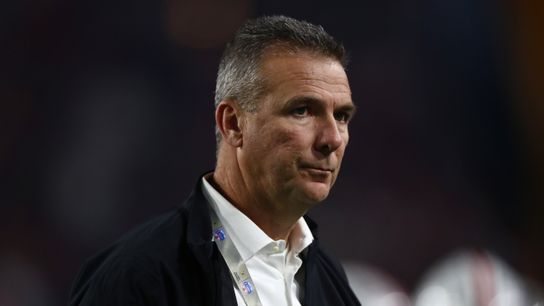Urban Meyer is many things, and one of them is a hyperbolic speaker. I was far from the first person to notice this, but here's how I described his verbal stylings last fall:
If you ever find yourself at a brunch spot with the future College Football Hall of Famer and he doesn't say their croissants are some of the best he's ever had, assume they're borderline inedible and order something else.
It's with that we dive into Urban's comments on NIL in a recent appearance on the Lou Holtz Show podcast, which is apparently a thing that exists.
“I think NIL, and I sat in those committees for many, many years, I think it’s great. I think if it’s capitalism, for example, if a great player like Marvin Harrison Jr. And some car dealership in town wants to hire him, they want to put his name on a billboard and pay him money, sign autographs. He wants to put something on an Instagram or they sell that. But that’s not what’s happened, Coach. What’s happened is it’s cheating,” Meyer said, via The Comeback.
“And there’s these things called collectives, where they go out and get money from donors and they get this big, giant mass of money and they pay players. And that’s not what the intent is. That name and likeness, that’s America. America is built on name and likeness," he said.
As we all learn in elementary school, America was founded when Thomas Jefferson and his teammates signed their name, image and likeness to the Declaration of Independence.
"If you have Lou Holtz or Urban Meyer or Marvin Harrison Jr., C.J. Stroud. They want to go use their name and help sell cars, help a business – that’s great. But to have a 17-year-old demand money for a visit or pay these players a lot of money to go visit a charity for 20 minutes, and they write a check for $50,000. That’s cheating," Meyer said. "That’s not what this is all about."
Okay, so we've got a lot going on here.
First of all, the Lou Holtz Show has somehow accessed a time machine for us to listen to a hot and topical conversation from 2021. Holtz's podcast is funded by the America First Policy Institute, so spelling out the differences between "true" NIL and collectives was probably actually an informative conversation for that audience.
Nevertheless, Urban's definition of capitalism is a little off here.
The only working definition of capitalism is that any good or service is worth what someone is willing to pay for it, and what happened when NIL became legal was that the below-the-table market economy for elite college football players moved above the table, and the entire nation saw how much those services are truly worth.
Regardless, it doesn't matter what my definition, or your definition, or Urban's definition of capitalism is. The Supreme Court ruled that the NCAA's business model was illegal, and part of the new, non-illegal business model is boosters paying salaries to be on the team.
Nowhere is that playing out more obviously than Urban's former team. Ryan Day made headlines when he told a group of boosters in 2022 that Ohio State would need $13 million a year to maintain a competitive roster. I don't know what it cost to keep every draft-eligible player outside of Marvin Harrison, Jr., and sign a top-5 recruiting class headlined by the nation's No. 1 player, and bring in transfers like Kansas State quarterback Will Howard, Ole Miss running back Quinshon Judkins and Alabama safety Caleb Downs, but I'm sure it's north of $13 million. Downs's commitment to Ohio State was announced not by the program, but by its collective.
This coming season will be Meyer's sixth out of college football, but his name will surely populate this fall when jobs inevitably come open. And when that happens, we all need to remember these quotes, because they're more relevant than his career .854 winning percentage and his three national championships. What more proof do we need that Urban Meyer was not built for this era of college football?
"What’s happened is the arms race of collecting money from donors, and the donors are simply paying players," Meyer said. "And that’s what I understand is happening, and I don’t like that.”
Powerful institutions using big money to bend an entire industry to its will? Urban, nothing could possibly be more American than that.
As always, stay tuned to The Scoop for the latest.
